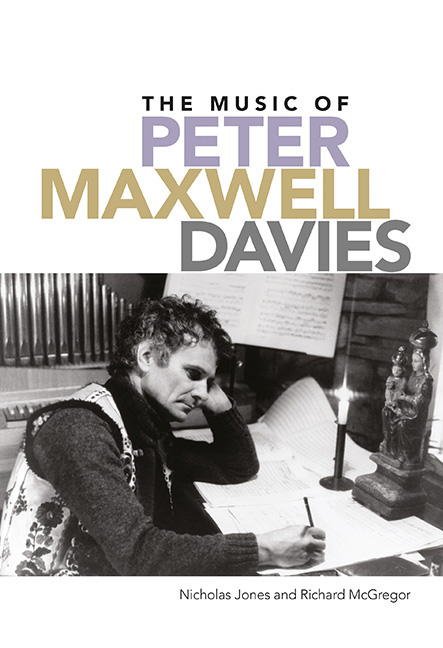Book contents
- Frontmatter
- Dedication
- Contents
- List of Illustrations
- Acknowledgements
- Prelude
- 1 Biography, Stylistic Development, Autobiography
- 2 Compositional Technique and Process
- 3 Genre
- 4 Form and Architecture
- 5 Tonality and Texture
- 6 Allusion, Quotation, Musical Critique
- 7 Landscape and Place
- Postlude
- Catalogue of Works
- Select Bibliography
- Index of Works by Peter Maxwell Davies
- General Index
7 - Landscape and Place
Published online by Cambridge University Press: 27 March 2020
- Frontmatter
- Dedication
- Contents
- List of Illustrations
- Acknowledgements
- Prelude
- 1 Biography, Stylistic Development, Autobiography
- 2 Compositional Technique and Process
- 3 Genre
- 4 Form and Architecture
- 5 Tonality and Texture
- 6 Allusion, Quotation, Musical Critique
- 7 Landscape and Place
- Postlude
- Catalogue of Works
- Select Bibliography
- Index of Works by Peter Maxwell Davies
- General Index
Summary
As highlighted in Chapter 4, Peter Maxwell Davies's lifelong obsession with architecture and architectural principles ran in parallel with other extramusical interests and preoccupations. One of the most significant of these was his fascination with the forms, characteristics and experiences of landscape. According to Andrew Goudie and Heather Viles:
Humans have a visceral connection with their natural surroundings, often reflected in a love of landscape. Feeling for landscape can simply result in active enjoyment, but can also be translated into art, poetry, and other cultural affirmations of scenery and landforms, as well into tangible interventions such as carvings, buildings and structures.
Davies certainly possessed a ‘visceral connection’ with his natural surroundings. This resulted in active enjoyment of being in the landscape, which translated into a cultural affirmation through the artistic medium of music. Indeed, landscape acted as a powerful and compelling agent that exerted its own influence on Davies's creative imagination. Stimulation also came from the natural world more broadly, especially from the soundscape of nature – birdcalls, weather and sea – and from specific places, including the serene–stormy splendour of Hoy's Rackwick Bay and Sanday's Airon and Holms of Ire, and the vibrant pulsation of particular cities.
As Daniel Grimley has argued, ‘considering the historical diversity of its forms, representations and meanings, it is not surprising that landscape is an ambivalent phenomenon that resists single definition.’ In the introduction to his seminal book Landscape and Memory, Simon Schama points out that western culture and nature are often assumed to be mutually exclusive entities; Schama challenges this assumption and instead is keen to emphasise ‘the strength of the links that have bound them together’:
For although we are accustomed to separate nature and human perception into two realms, they are, in fact, indivisible. Before it can ever be a repose for the senses, landscape is the work of the mind. Its scenery is built up as much from strata of memory as from layers of rock.
Likewise, in his 1996 essay ‘Von der Wirkung der Landschaft auf den Menschen’, Siegfried Lenz – an author whom Davies greatly admired – argues persuasively that: ‘We perceive the intrinsic energy of landscapes as an inner experience.’
- Type
- Chapter
- Information
- The Music of Peter Maxwell Davies , pp. 251 - 302Publisher: Boydell & BrewerPrint publication year: 2020



